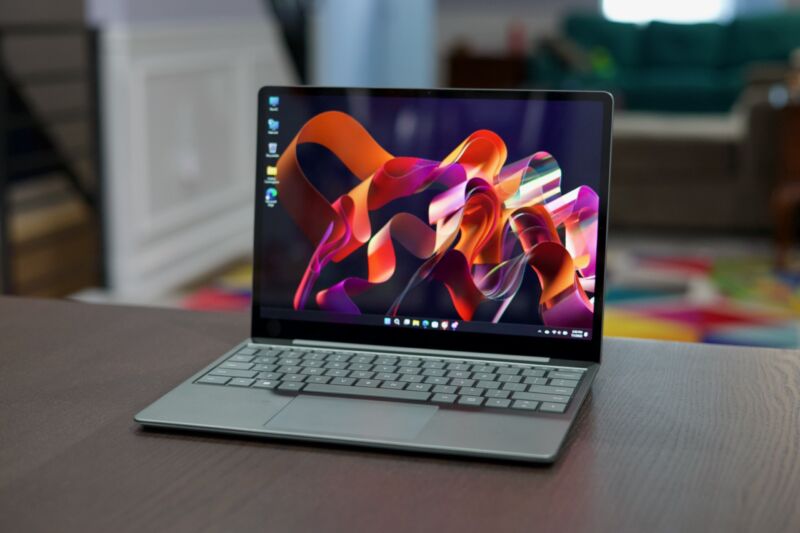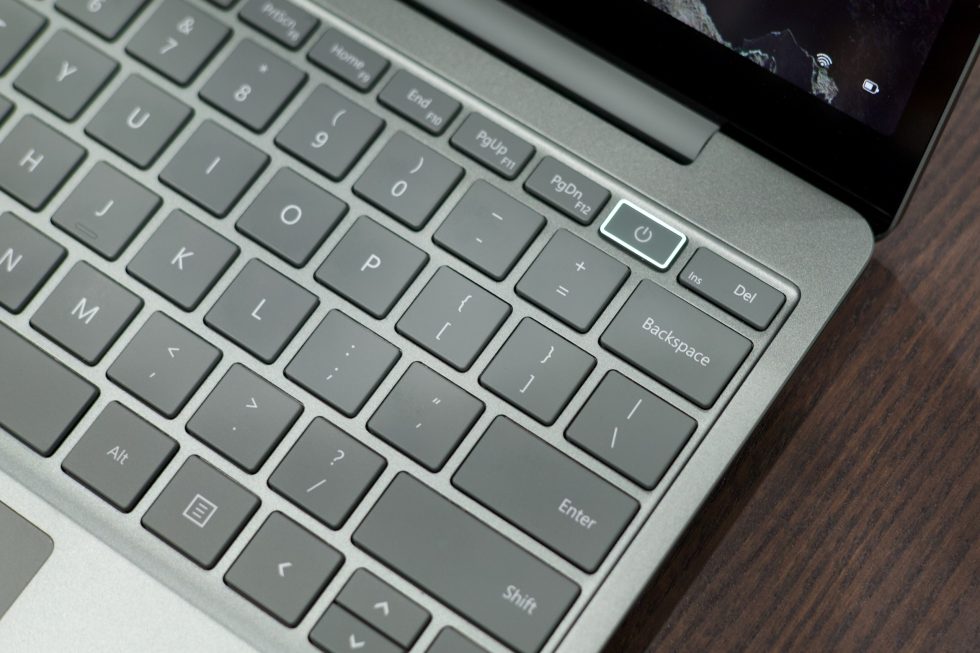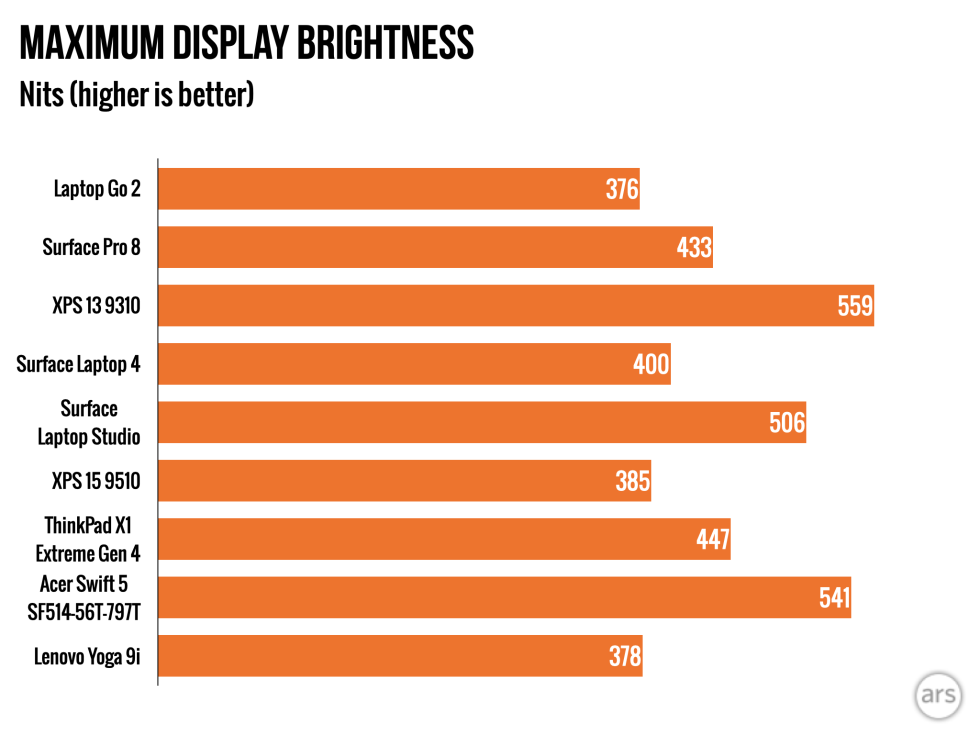
Andrew Cunningham
Anyone who buys a Microsoft Surface Laptop Go 2 should go into it fully aware of the laptop’s shortcomings.
The first and most important is that the base model, the one that gives it its attractive $600 starting price, comes with only 4GB of non-upgradeable RAM and should be ignored by pretty much everybody. Seriously, don’t buy it, and don’t try to talk yourself into it just to save money.
Behave as though the actual starting price is $700, the amount it costs to get the configuration with 8GB of RAM and 128GB of storage. This is still closer to “budget” than “high-end” as ultrabooks go, but the list of omissions, shortcomings, and odd decisions does get harder to overlook as you spend more money. The generation-old processor. The un-backlit keyboard. The tiny port selection. A touchscreen that is neither particularly high-resolution nor very colorful. A 128GB SSD that will feel cramped for many people, and a 256GB option that (1) isn’t all that much bigger and (2) adds another $100 to the price.
None of these problems should be glossed over or ignored. But as frustrating as some of them are, the fact remains that the Laptop Go 2 is a cute, lightweight, competent laptop that’s a pleasure to use. Microsoft gets most of the important things right here, and there’s no laptop in this price range that doesn’t come with some kind of trade-off.
Especially if you can find it on sale—and the old Laptop Go was discounted regularly by Microsoft, Best Buy, and others that sold it—the Laptop Go 2 is a no-fuss budget laptop that’s worth considering if you can live with its flaws .
Thoughtful design, minimalist features

Andrew Cunningham
| Specs at a glance: Microsoft Surface Laptop Go 2 | |
|---|---|
| screen | 12.4-inch 1536×1024 touchscreen (148 PPI) |
| OS | Windows 11 Home |
| CPU | 4-core/8-thread Intel Core i5-1135G7 |
| RAM | 4GB or 8GB LPDDR4x |
| GPU | Intel Iris Xe graphics (80 EUs) |
| Storage | 128GB or 256GB NVMe SSD |
| Battery | 41 WHr |
| Networking | Wi-Fi 6 (802.11ax), Bluetooth 5.1 |
| Ports | USB-A, USB Type-C, Surface Connect, 3.5 mm headphone |
| Size | 10.95×8.12×0.62 inches (278.2×206.2×15.7 mm) |
| Weight | 2.48 lbs (1.12kg) |
| Warranty | 1 year |
| Price as reviewed | $799.99 |
| Other perks | 720p webcam, power button-mounted fingerprint reader on 8GB models |
Externally, the Surface Laptop Go 2 is indistinguishable from the original. Microsoft hasn’t changed the keyboard, trackpad, screen, or chassis at all, opting merely to replace the internals. The only external difference is the addition of a color called “Sage,” a vaguely green-tinted silver finish that complements the returning pink-tinted Sandstone, blue-tinted Ice Blue, and non-tinted Platinum options. It weighs less than 2.5 pounds, and it’s super easy to pick up and carry around, whether you’re slinging it in a bag to travel or just moving between rooms in your home.
If you’re not familiar with the original Laptop Go, here’s a brief recap: The laptop has a lightweight aluminum lid and palm rest, combined with a plastic bottom cover. The combination is lightweight and reasonably sturdy-feeling, even though the thin aluminum feels a bit more pliable than what you get with a MacBook, a Dell XPS, or Microsoft’s own higher-end Surface and Surface Laptop devices. The trackpad is on the small side, but it’s accurate and responsive. And while the keyboard lacks a backlight, its key spacing and travel both feel pleasant, and its power button-mounted fingerprint sensor is a welcome addition.
The laptop’s biggest point of departure from other laptops in this price range is a 12.5-inch 1536×1024 screen with a 3:2 aspect ratio, making it narrower but much taller than the 16:9 or 16:10 screens in most ultrabooks. The screen’s 376-nit peak brightness, 1,159:1 contrast ratio, and color gamut coverage (94 percent of the sRGB gamut, just 68.5 percent of the DCI-P3 gamut) are all just fine for the price.

Andrew Cunningham
But the display isn’t as dense as a more typical 13.3-inch 1080p or 1920×1200 screen (about 149 PPI, down from the mid-to-high 160s), which makes text look a bit jaggy by comparison, especially at smaller sizes and lighter weights. But the screen’s size and aspect ratio are great for a laptop this small and light. If you happen to be replacing an older 11.6-inch 16:9 netbook-y budget laptop with the Laptop Go 2, the difference is night and day.
-
Almost all of the Surface Laptop Go 2’s ports are on the left side: one USB-A, one USB-C (which can charge the laptop but isn’t the primary charging port), and a headphone jack.
Andrew Cunningham
-
The only port on the other side is the proprietary Surface Connect port.
Andrew Cunningham
It’s harder to like the Laptop Go 2’s port selection, though it shares this shortcoming with the bigger Surface Laptop. You get a single USB-A port, a single USB-C port, a headphone jack, and the proprietary Surface Connect port—and that’s it. It’s nice to be able to charge the laptop without blocking either USB port, and it’s handy to be able to charge via the USB-C port if you need or prefer to. It’s just a bare-minimum selection of ports, and we’d trade Surface Connect for another USB-C port any day.
And while it doesn’t really make a difference in the day-to-day use of the device, there’s something to be said for getting some of the fringe benefits of Surface ownership in a less-expensive laptop. There are a lot of Windows devices out there that can’t pull down UEFI firmware updates or other hardware/firmware-level security features seamlessly through Windows Update, and most budget devices are lucky to get many of these kinds of updates at all. To its credit, Microsoft keeps budget-focused devices like the Surface Go or Surface Laptop Go updated regularly.